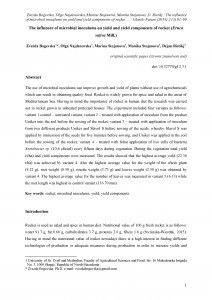The use of microbial inoculums can improve growth and yield of plants without use of agrochemicals which can result in obtaining quality food. Rocket is widely grown for spice and salad in the areas of Mediterranean Sea. Having in mind the importance of rocket in human diet the research was carried out in rocket grown in unheated protected houses. The experiment included four variants as follows: variant 1 control – untreated variant; variant 2 – treated with application of inoculum from the product Uniker into the soil before the sowing of the rocket; variant 3 – treated with application of inoculum from two different products Uniker and Slavol S before sowing of the seeds, whereby Slavol S was applied by immersion of the seeds for five minutes before sowing, and Uniker was applied in the soil before the sowing of the rocket; variant 4 – treated with foliar application of live cells of bacteria Azotobacter sp. (10-6 cfu/ml) every fifteen days during vegetation. During the vegetation total yield (t/ha) and yield components were measured. The results showed that the highest average yield (22,30 t / ha) was achieved by variant 4. Also the highest average value for the weight of the whole plant (4,22 g), root weight (0,50 g), rosette weight (3,73 g) and leaves weight (2,50 g) was obtained by variant 4. The highest average value for the number of leaves was measured in variant 3 (6,13) while the root length was highest in control variant (116,70 mm).
Sažetak

 Glasilo Future : stručno-znanstveni časopis 2,3(2019) / glavni i odgovorni urednik Boris Dorbić.
Glasilo Future : stručno-znanstveni časopis 2,3(2019) / glavni i odgovorni urednik Boris Dorbić.